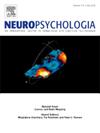Follow the script: the role of vmPFC in the reinstatement and instantiation of event schemata during event construction
IF 2
3区 心理学
Q3 BEHAVIORAL SCIENCES
引用次数: 0
Abstract
Previous evidence has shown that the ventromedial prefrontal cortex (vmPFC) has a role in schematic processing and event construction. Here, we tested whether vmPFC mediates the activation of event schemata (scripts; i.e. reinstatement), or their instantiation during event construction. vmPFC patients and healthy and brain-damaged controls performed (1) a script production task and (2) an event generation task in three experimental conditions: in one condition the to be imagined events did not obey a script (non-scripted condition), in one condition they obeyed a script (scripted condition), and in one condition they obeyed a script that served as an external cue for event generation (cued-scripted condition). At the script production task, vmPFC patients showed accurate knowledge of the main structure of scripts, but insufficient knowledge of their finer details, suggesting impaired script reinstatement. In line with previous studies, vmPFC patients’ event construction performance was impaired in the non-scripted and scripted condition; however, it significantly improved when the script of the to be constructed events was externally cued during event generation, suggesting preserved schema instantiation. These findings indicate that vmPFC integrity is crucial for the reinstatement of scripts, but not for their instantiation when externally provided.
遵循脚本:vmPFC在事件构建期间恢复和实例化事件模式中的作用
先前的证据表明,腹内侧前额叶皮层(vmPFC)在图式处理和事件构建中起作用。在这里,我们测试了vmPFC是否介导事件图式(脚本)的激活;即恢复),或者在事件构造期间实例化它们。vmPFC患者和健康及脑损伤对照组在三种实验条件下执行(1)脚本生成任务和(2)事件生成任务:在一种条件下,想象的事件不服从脚本(非脚本条件),在一种条件下,他们服从脚本(脚本条件),在一种条件下,他们服从脚本作为事件生成的外部线索(脚本条件)。在脚本制作任务中,vmPFC患者对脚本的主要结构有准确的认识,但对其细节的认识不足,提示脚本恢复受损。与先前的研究一致,vmPFC患者在非脚本和脚本条件下的事件构建能力受损;然而,当要构造的事件的脚本在事件生成过程中被外部提示时,它会显著改善,这表明保留模式实例化。这些发现表明,vmPFC完整性对于脚本的恢复至关重要,但对于外部提供的脚本实例化则不是如此。
本文章由计算机程序翻译,如有差异,请以英文原文为准。
求助全文
约1分钟内获得全文
求助全文
来源期刊

Neuropsychologia
医学-行为科学
CiteScore
5.10
自引率
3.80%
发文量
228
审稿时长
4 months
期刊介绍:
Neuropsychologia is an international interdisciplinary journal devoted to experimental and theoretical contributions that advance understanding of human cognition and behavior from a neuroscience perspective. The journal will consider for publication studies that link brain function with cognitive processes, including attention and awareness, action and motor control, executive functions and cognitive control, memory, language, and emotion and social cognition.
 求助内容:
求助内容: 应助结果提醒方式:
应助结果提醒方式:


